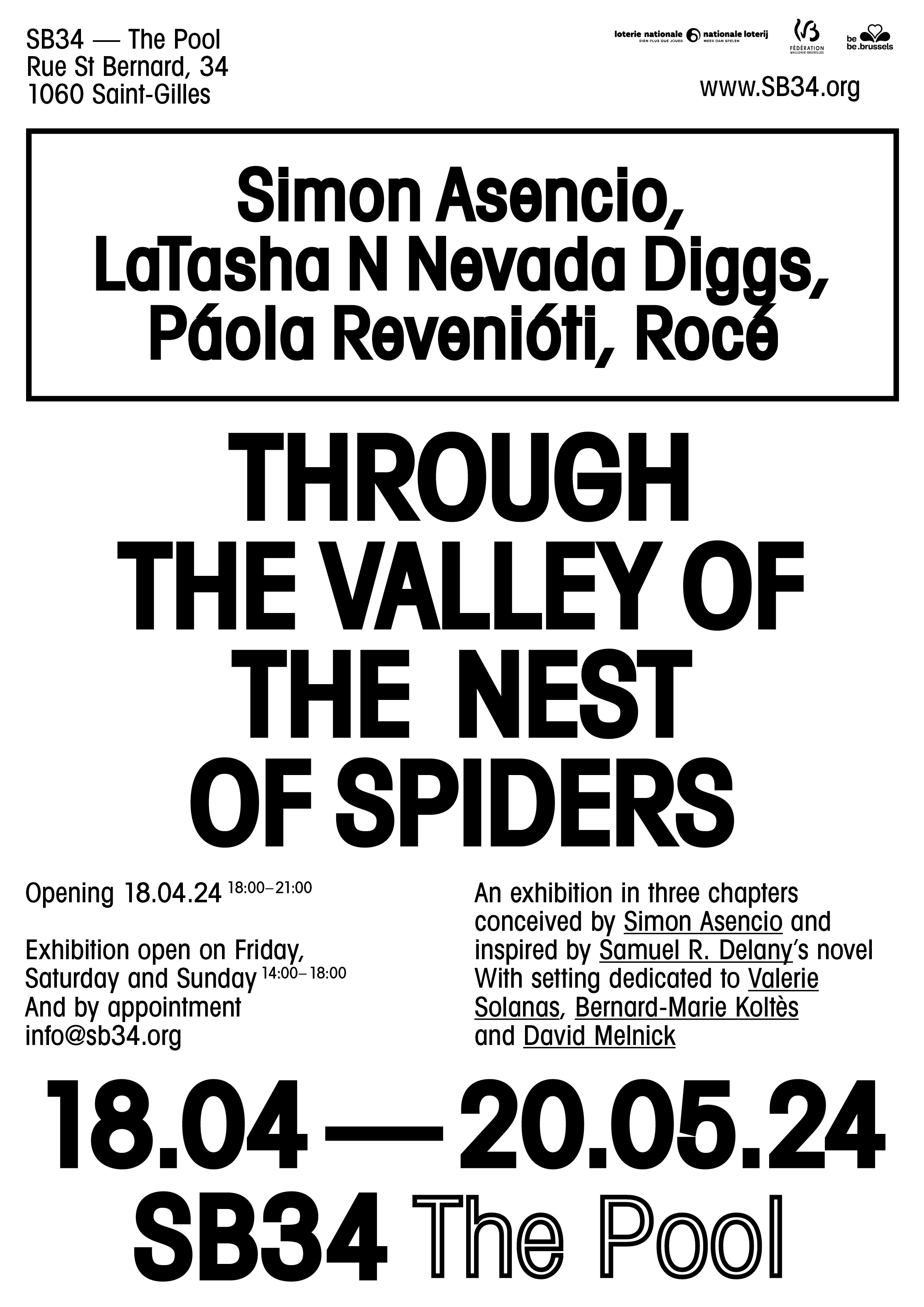
︎ SB34 The Pool
THROUGH THE VALLEY OF THE NEST OF SPIDERS
A proposal in three chapters by Simon Asencio
An exhibition in three chapters inspired by Samuel R. Delany’s novel, with works by LaTasha N Nevada Diggs, Páola
Revenióti, Rocé, in settings by Simon Asencio dedicated
to plays by Valerie Solanas, Bernard-Marie Koltès and
David J. Melnick.
18.04 - 20.05.24
︎ TEXT
To be invisible in a text, or to be invisible through a text, is to be illegible, opaque, nebulous, unfathomable, unintelligible, indescribable. This invisibility is often defined in terms of estrangement: it's a strategy to protect oneself, or a measure imposed to ostracize and exclude the “inappropriate”, the “unwanted”, the “other.”
In the book Through The Valley Of The Nest Of Spiders by Samuel R. Delany, one of the characters named Dynamite, explains to his lover Eric what "A culturally invested language" is: a slang or jargon that deviates (from) the official language to make forms of life appear and disappear according to the context in which it is spoken: reversals of stigma, vernaculars, community parlances become tools for recognition and protection. Dynamite adds: "Culturally invested language is for includin' people not for excludin' em." This term is used only once in this 800-page story. It does not appear in any other book or theoretical text. It seems that Samuel R. Delany coined the term to describe the language tools used by this fictional homosexual community, and left it there as a clue.
This exhibition is an attempt to apprehend this term through a set of propositions and textual experiments–other possible culturally invested languages–distant in time, space and motives, and yet which could contribute to an understanding of its ethical and poetic stakes.
Who makes up language? This question lies at the heart of this project, suggesting that the substance of a language is made up of all the people who use it, and that the transgression of its norms contributes to its development. How to then share these acts of language, these subversions, without disclosing them?
Conceived as temporary scenographic spaces that link writing with architecture, each setting pays tribute to characters, places and language tools that set the scene for the exhibition. Each chapter of the exhibition then becomes a support for a video projection, and two sound pieces by three artists: French Algerian rapper Rocé, Greek film director Páola Revenióti, US writer LaTasha N Nevada Diggs.
- Simon Asencio
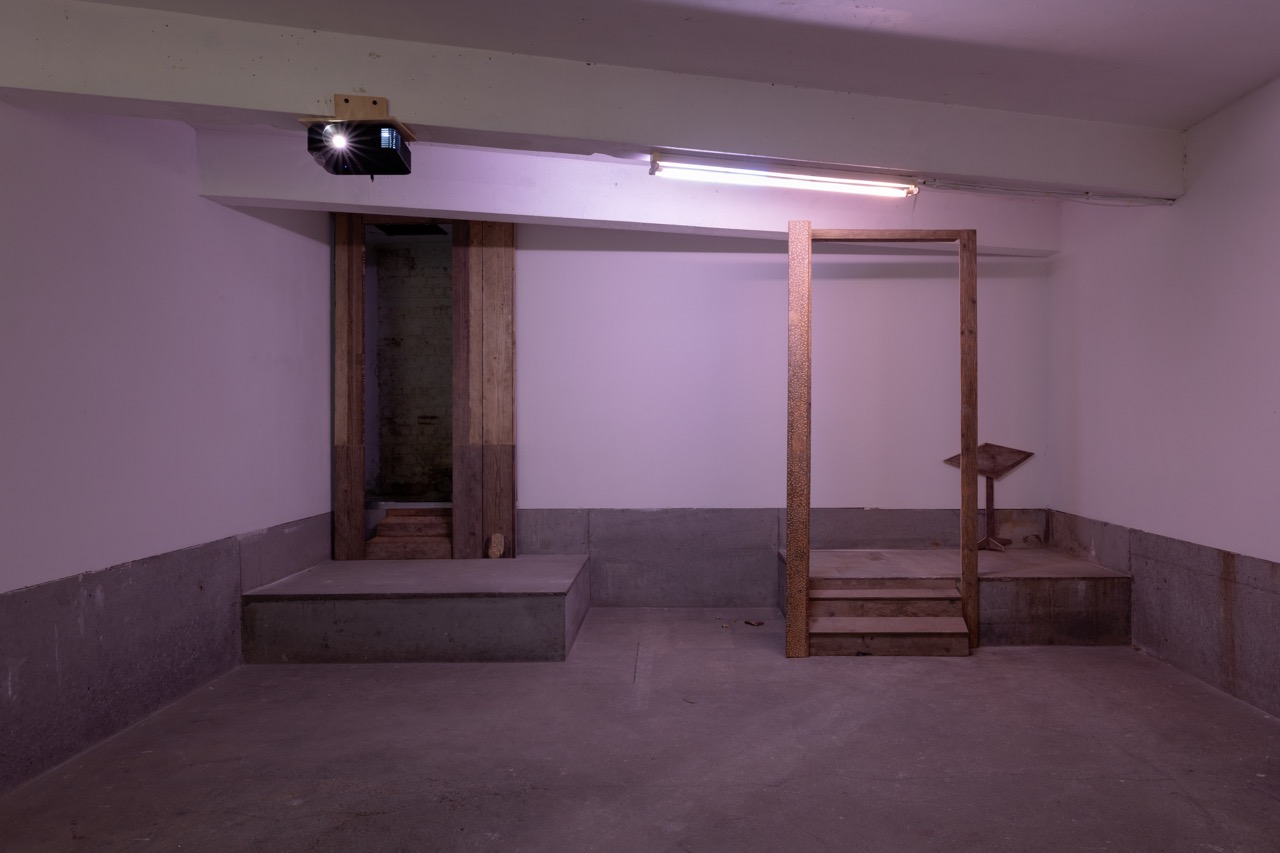
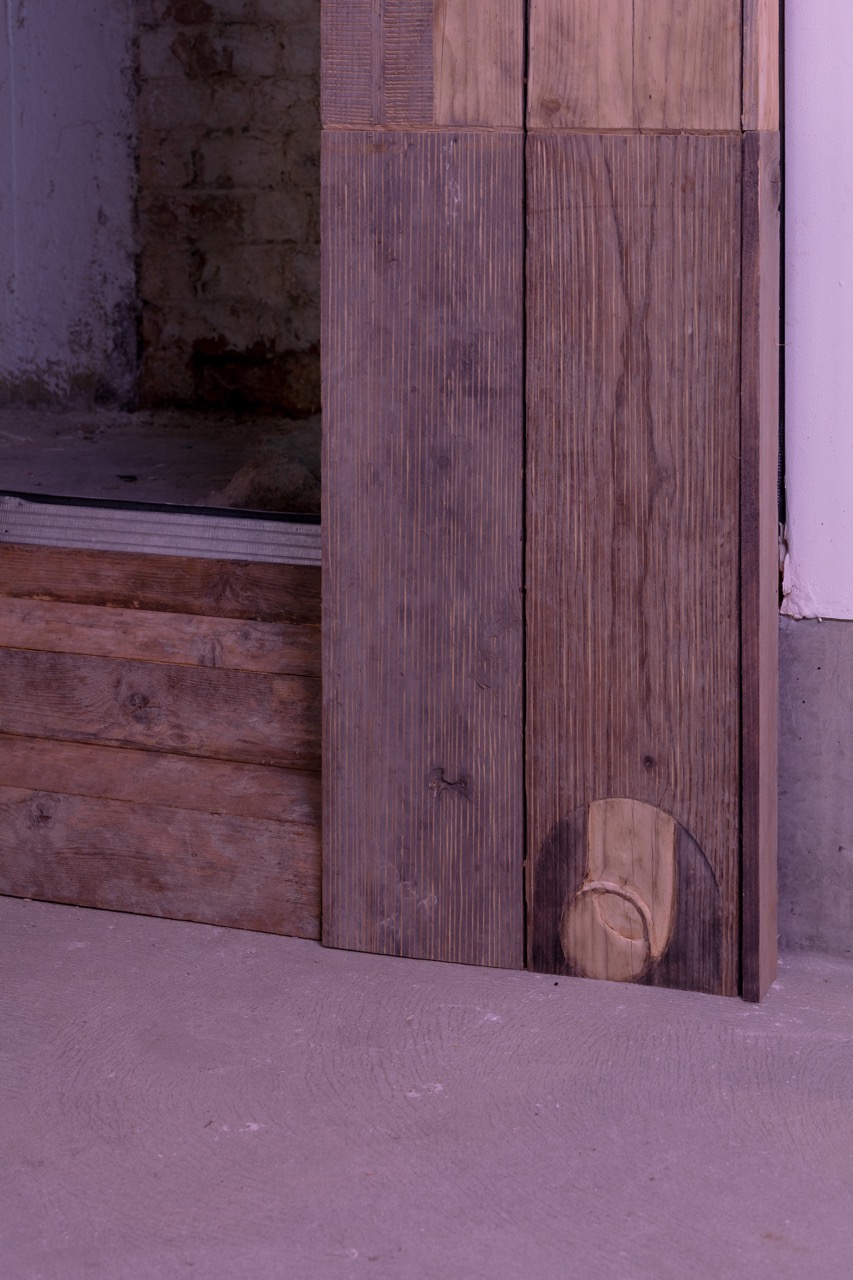
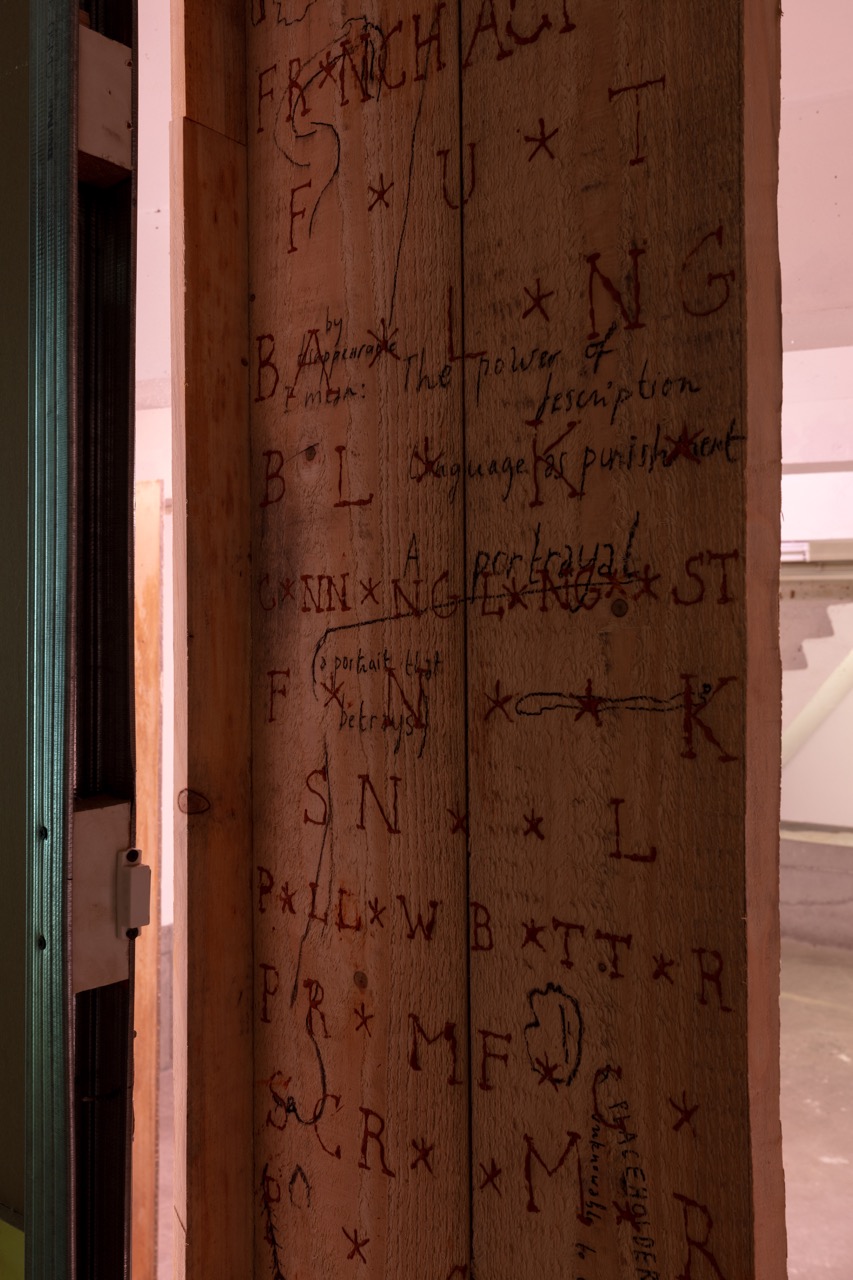
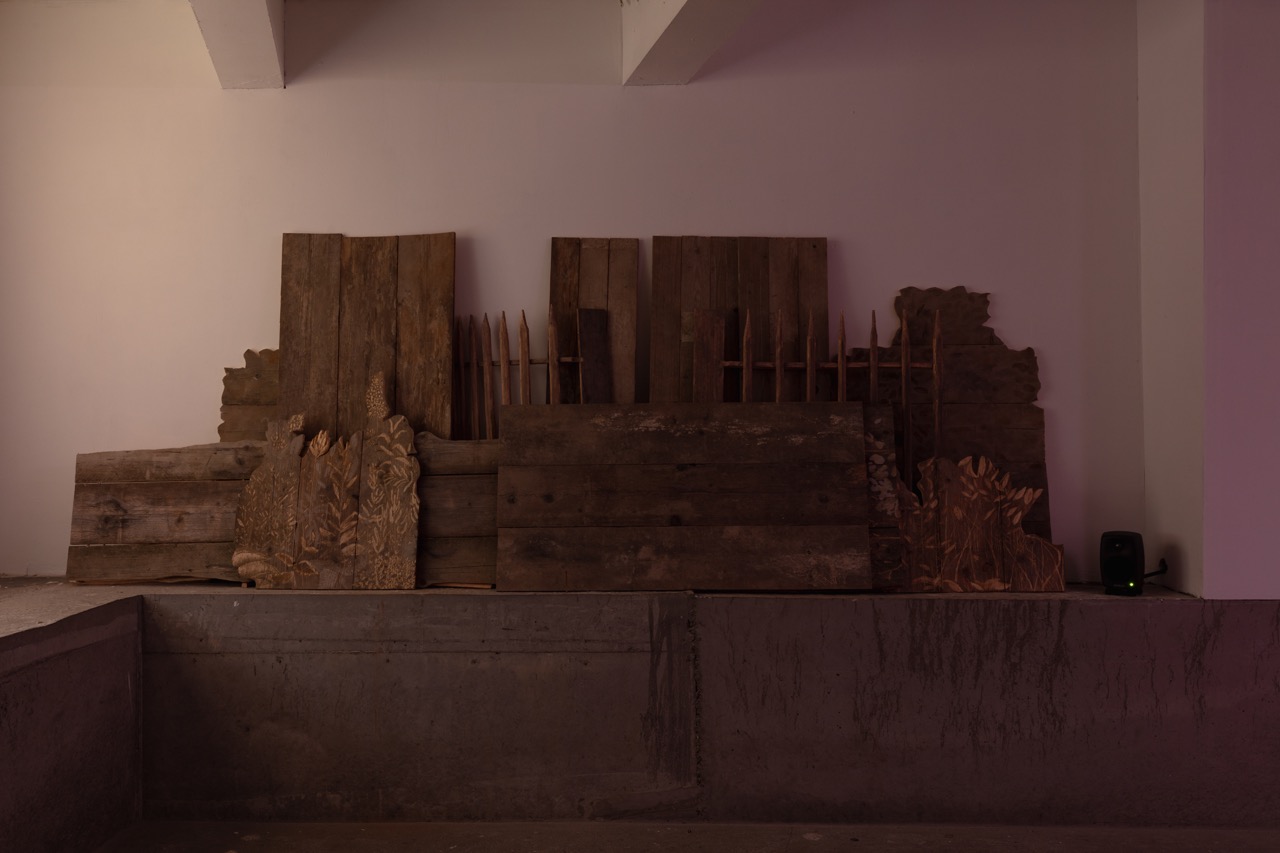
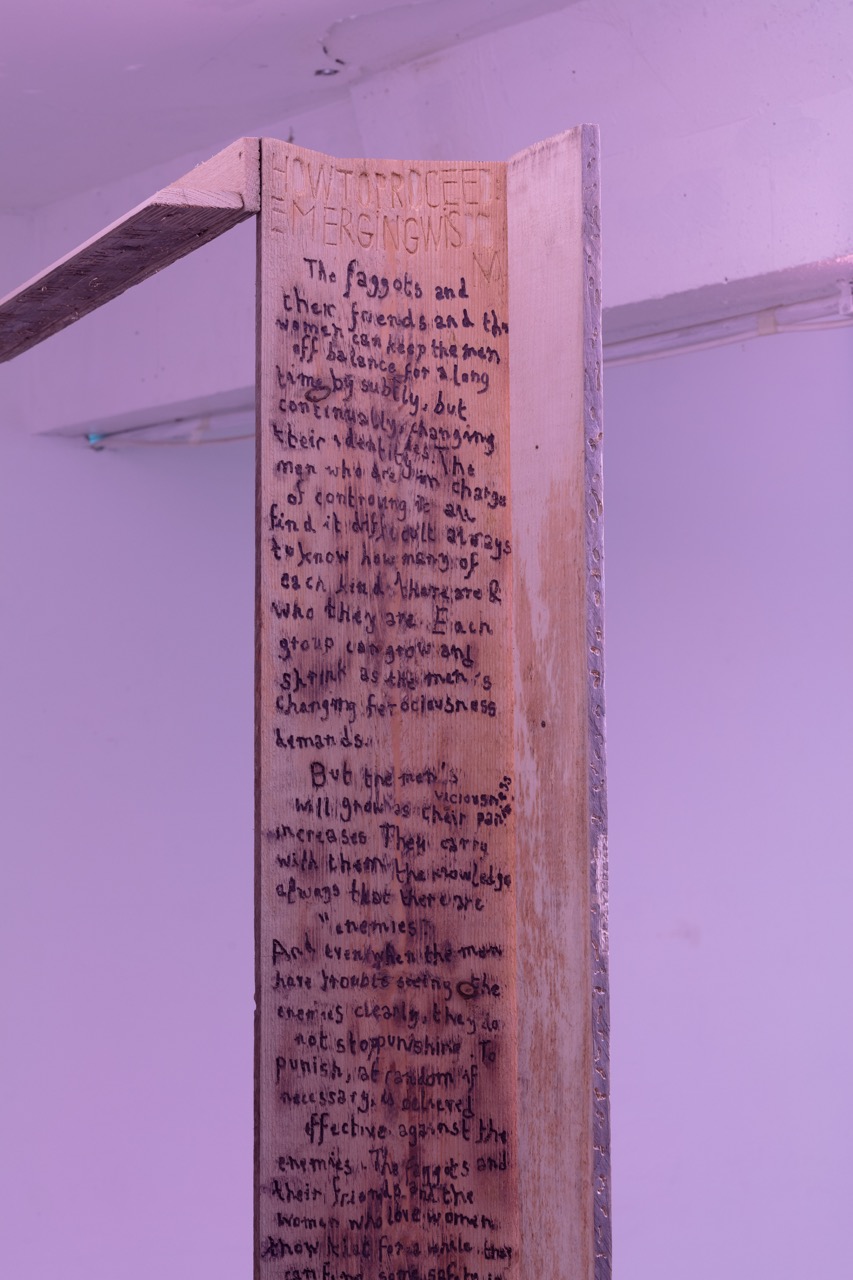
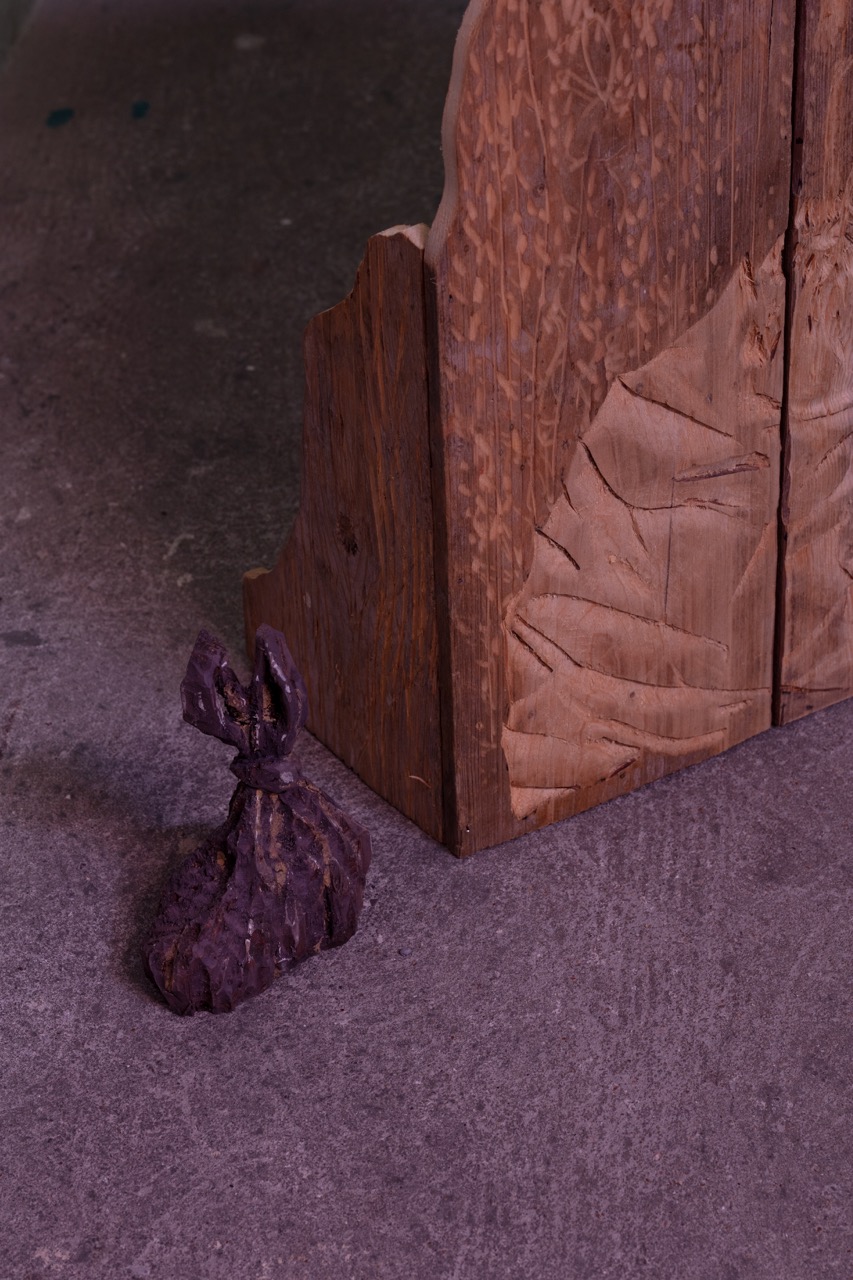
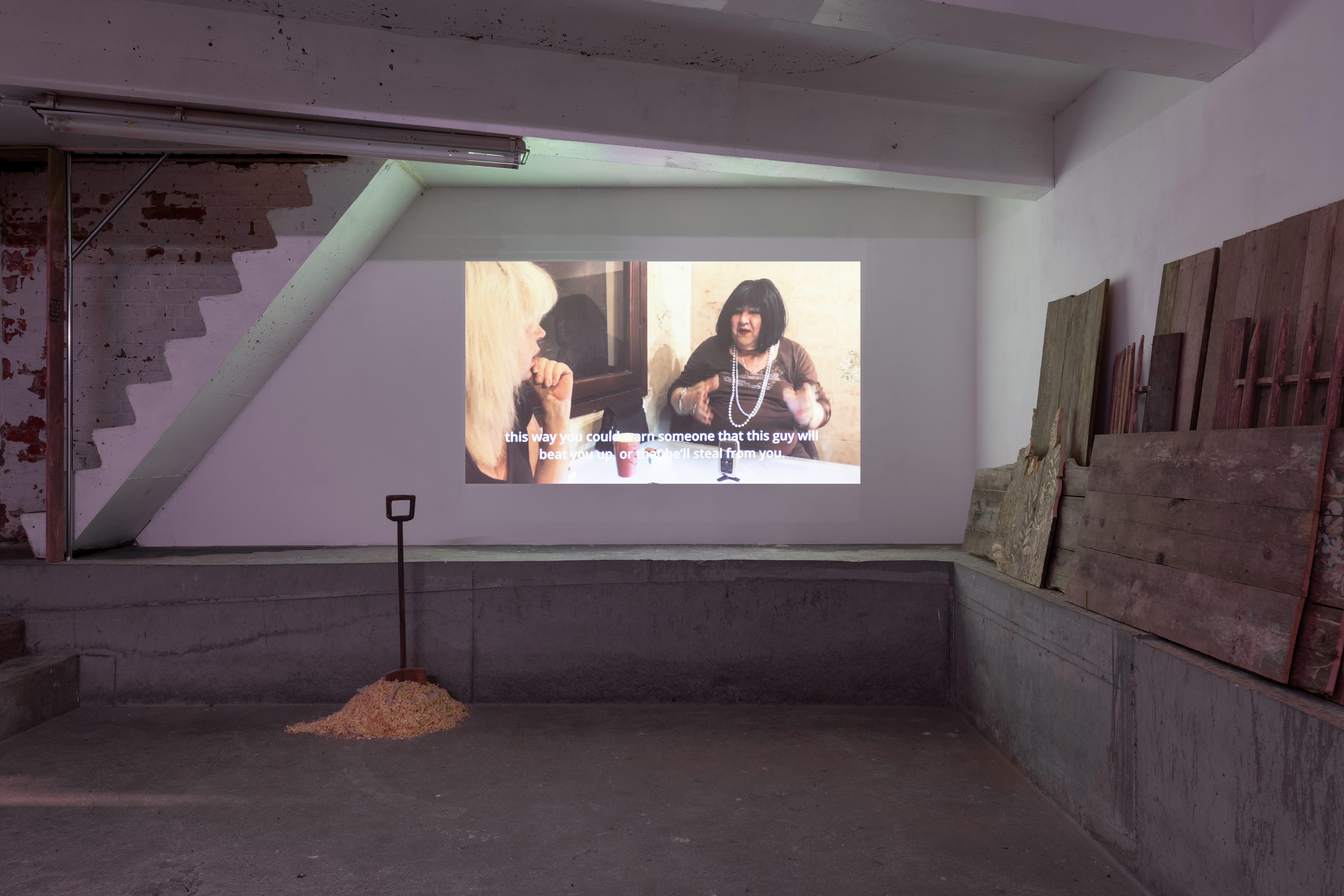
(c) Silvia Cappellari
︎ Chapter I, 18.04.24
Páola Revenióti, Kaliardà (2015), documentary screened in a setting dedicated to Valerie Solanas's Up Your Ass or From The Craddle To The Boat or The Big Suck or Up From The Slime (1965)
Páola Revenióti has been active in the greek LGBTIQ+ movement as documentarian, photographer, publisher, and trans* sexworker since 1970. Her film Kaliardà documents the history of kaliardá, a secret language in use by the LGBTIQ+ and sex worker community in urban centers of Greece at the beginning of the 20th century. With the end of the dictatorship in 1974 and the rise of more visibility and less repression of the LGBTIQ+ community, kaliardà has lost its initial necessity–a means for recognition and preservation in public space. Páola Revenióti’s documentary tracks a possible narrative of this language and along the way records the history of the community in Greece during the twentieth century.
The setting in which the documentary is screened is dedicated to the legendary play by writer and radical feminist Valerie Solanas, Up Your Ass or From The Craddle To The Boat or The Big Suck or Up From The Slime. Only recently discovered (1999), the play explores social and sexual mores of zany characters–most probably based on people Valerie Solanas knew in real life–in the New York street life of the 1960s. The play follows the main character, Bongi Perez, a lesbian sex worker committed to the refusal of work and the disparaging of patriarchal society. Bongi’s verbal quick-tongued exchanges with the other characters seem to prefigure the writing of the SCUM Manifesto.
Video projection, 58’
Bush, doorsteps, shovel, cigarette butts, bones, tissue paper and dog waste bag (engravings, sculptures and drawings on scaffolding wooden panels, chalk, carbon, clay, aluminum structures).
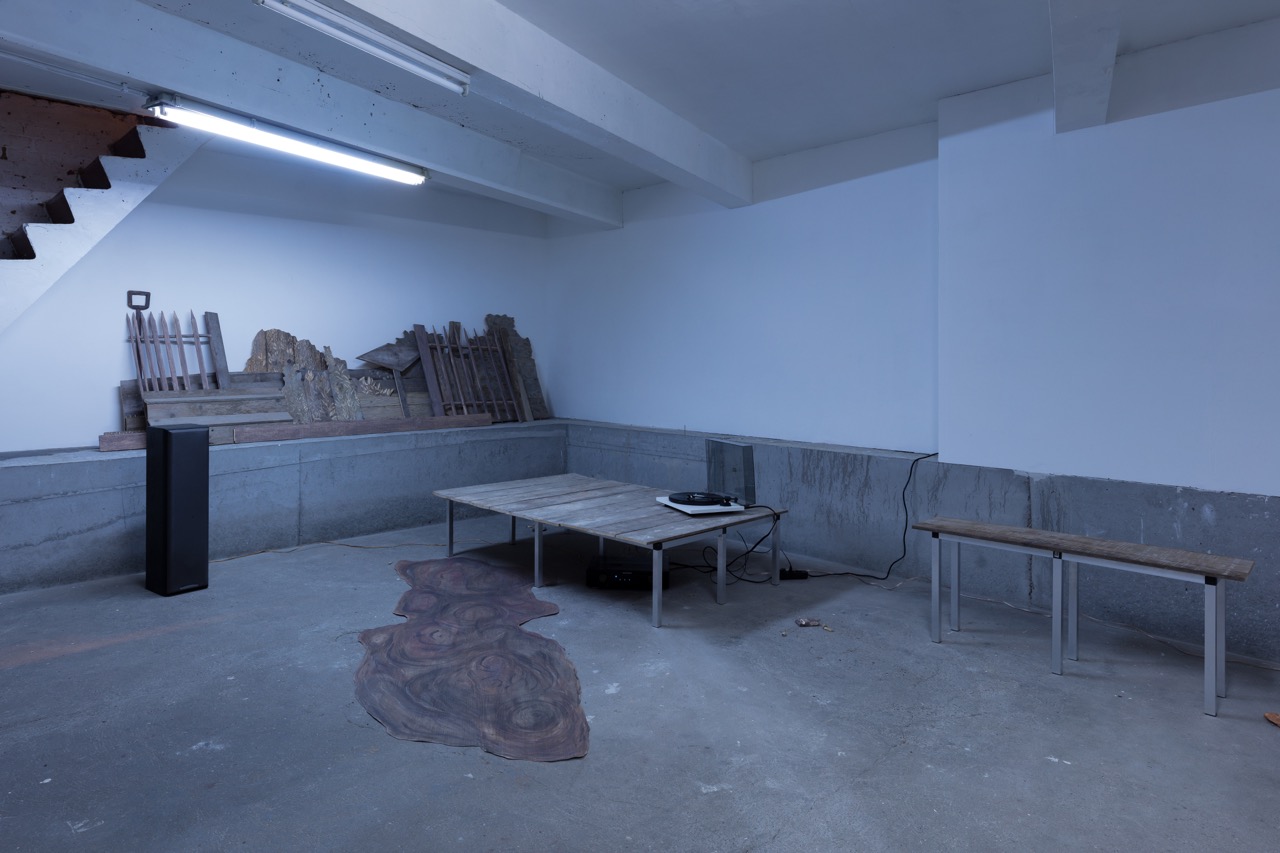
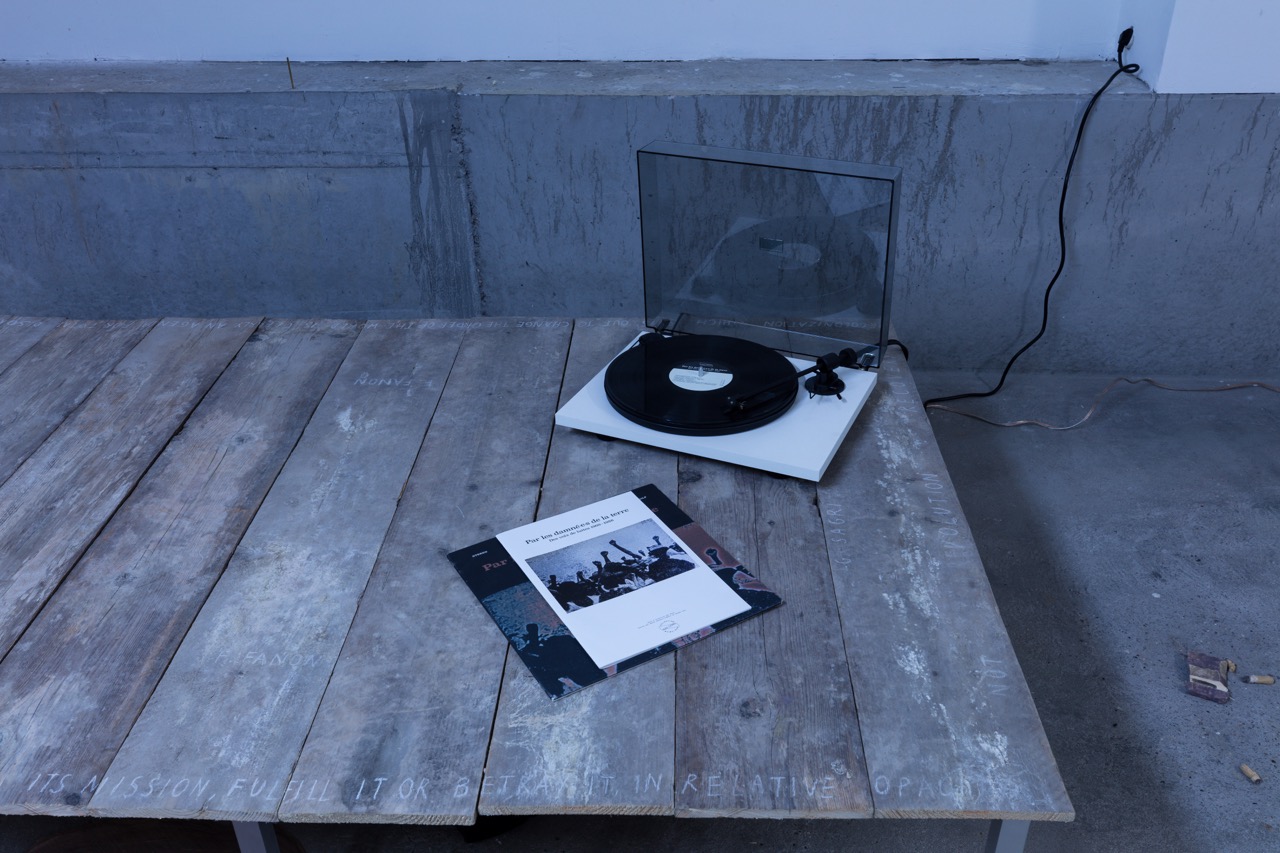
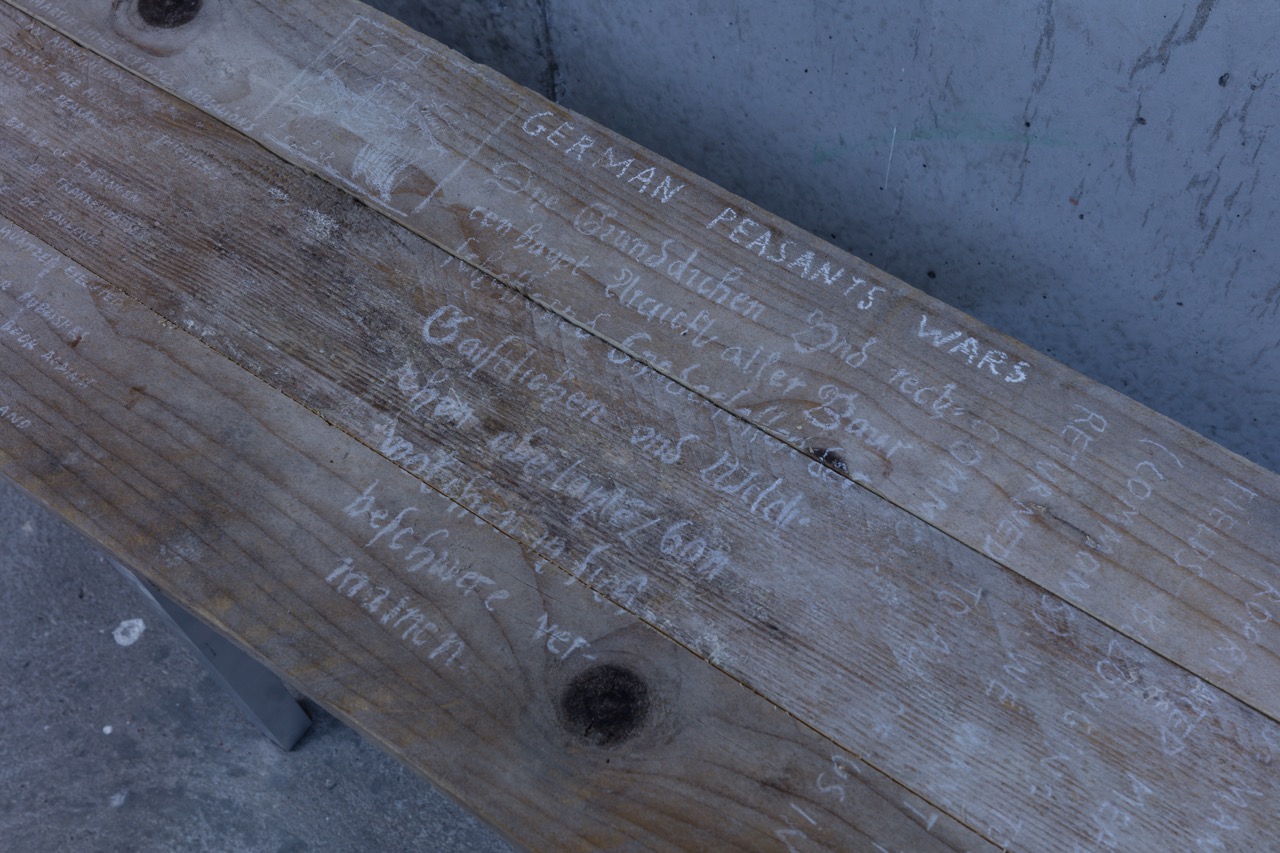
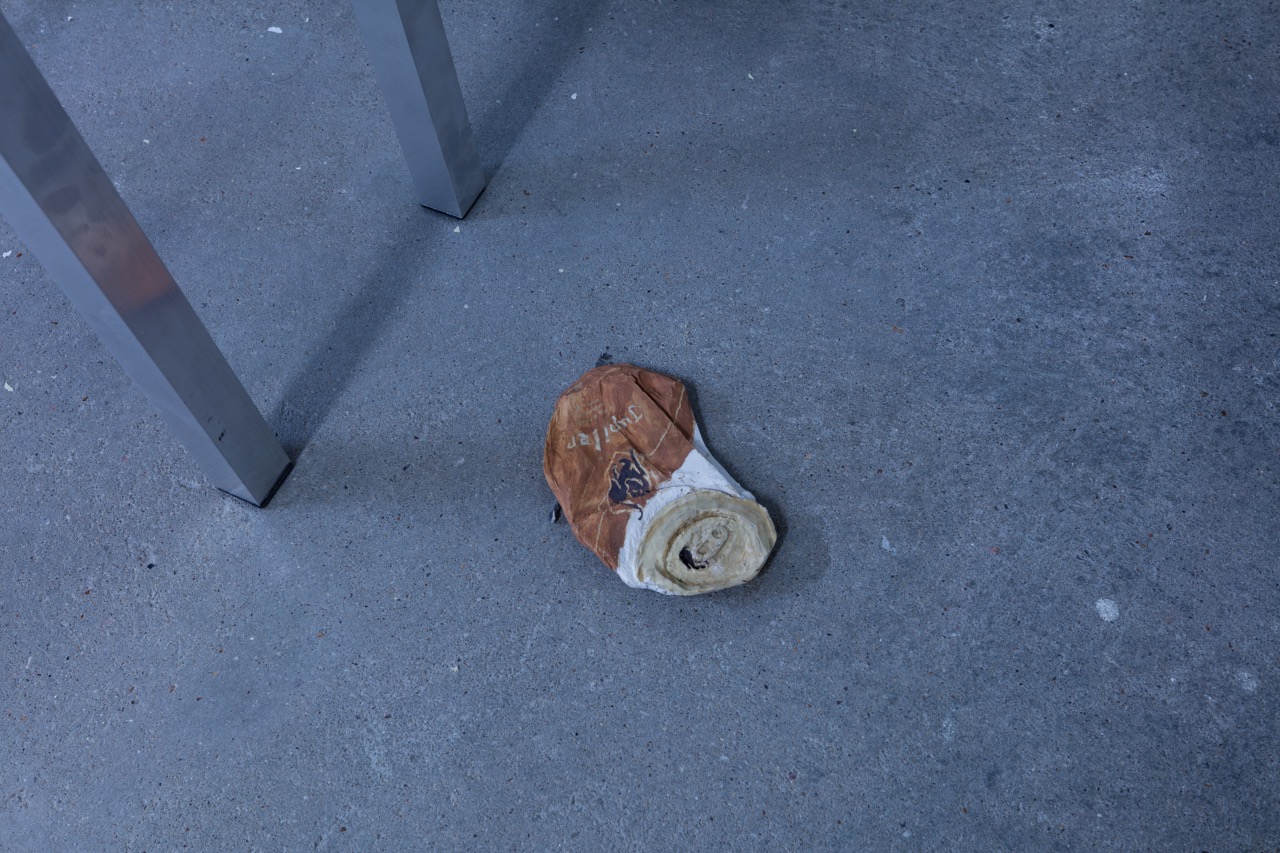
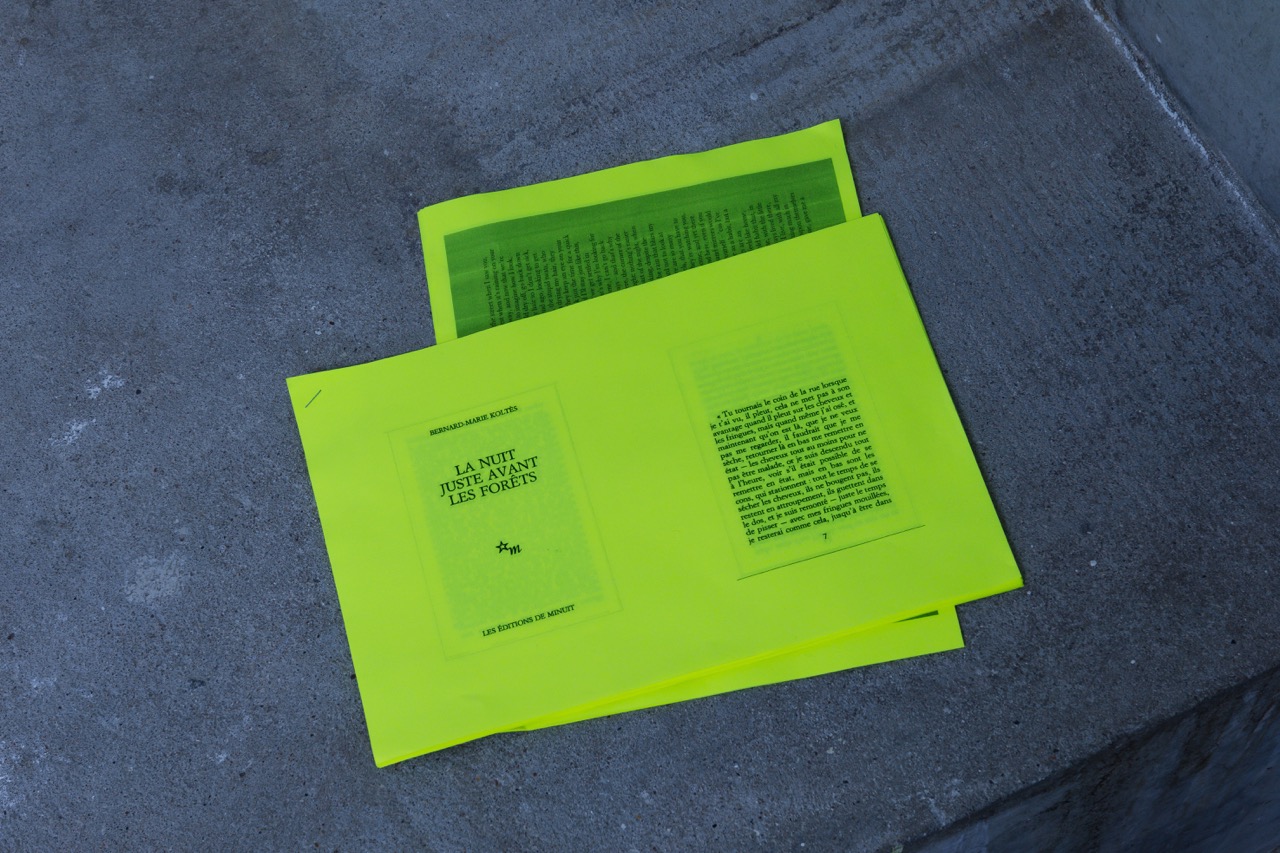
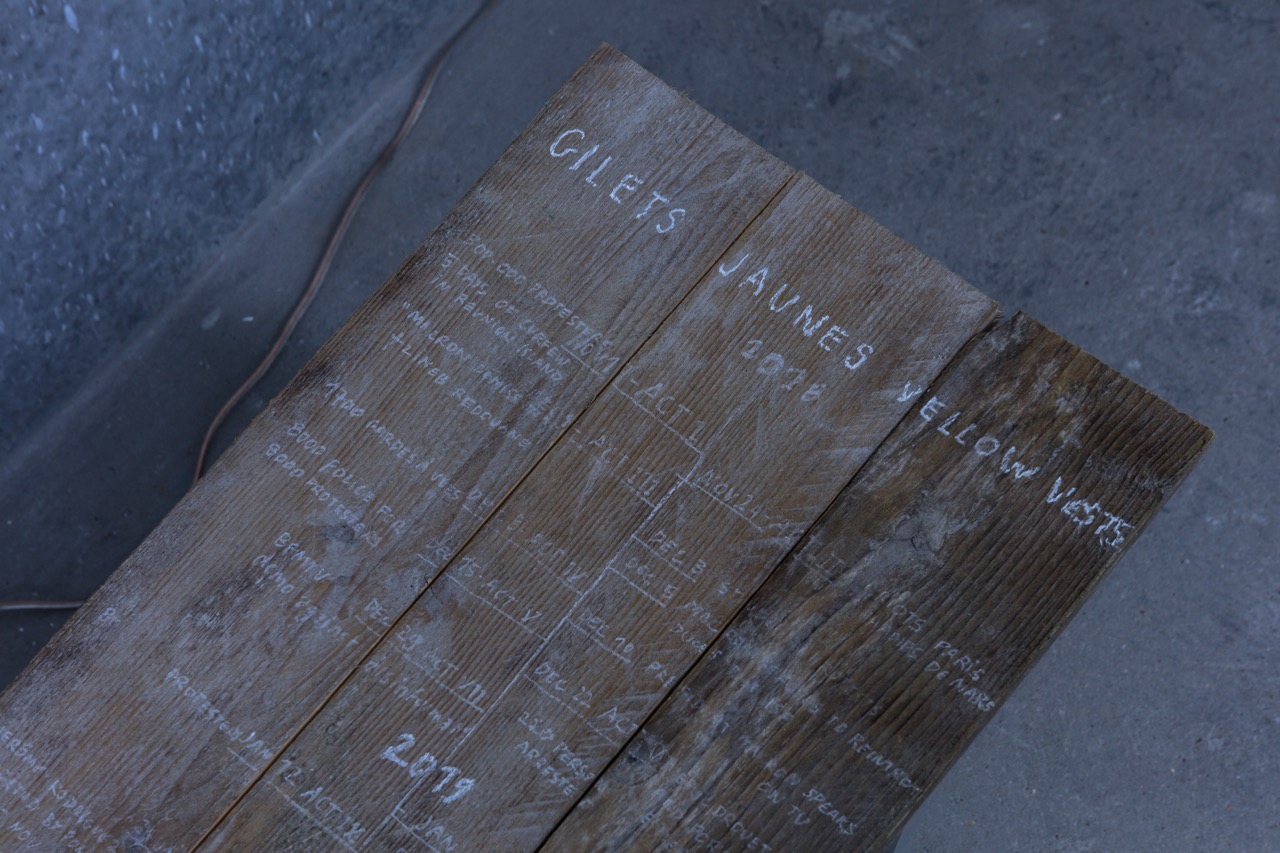
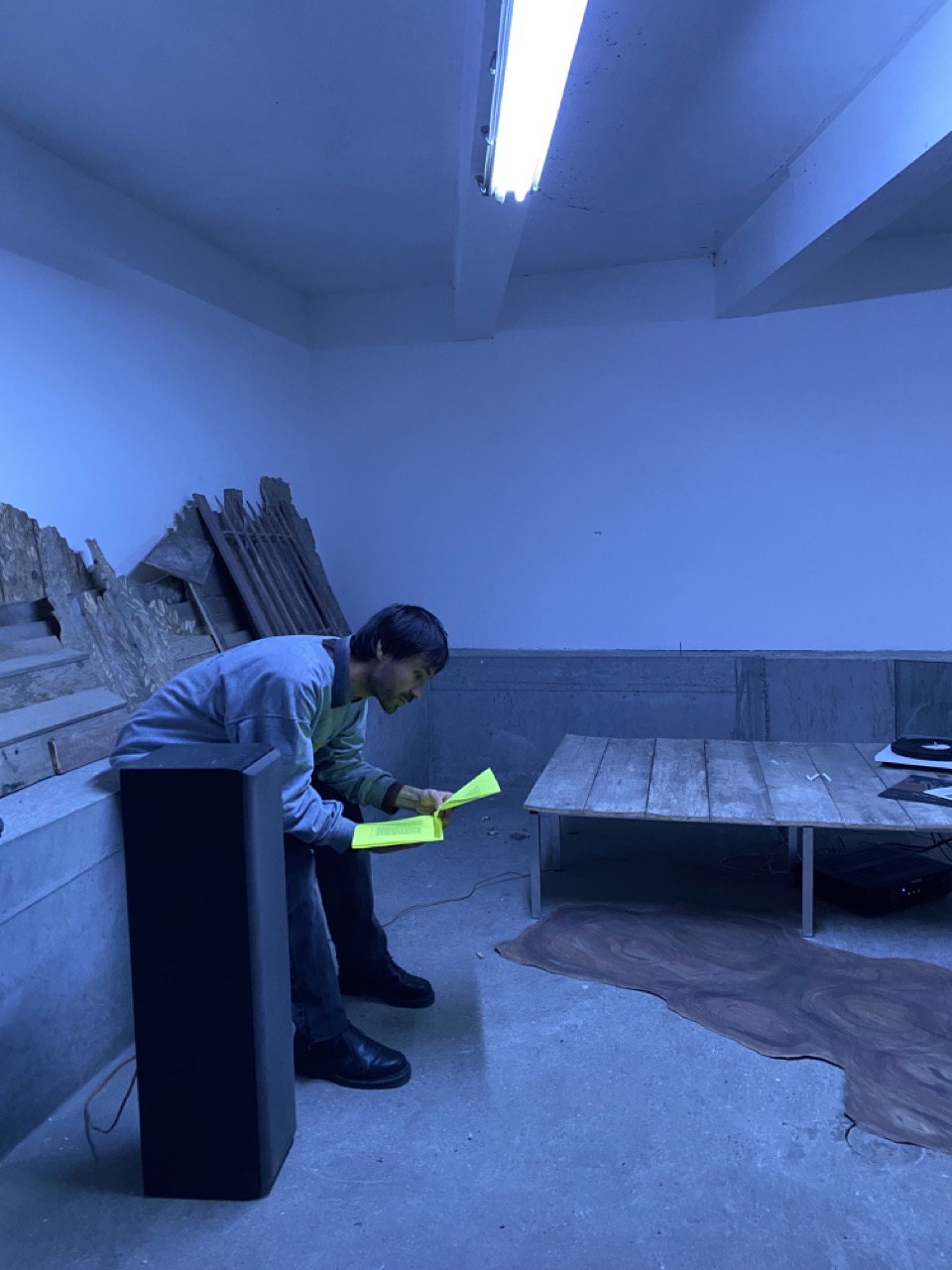
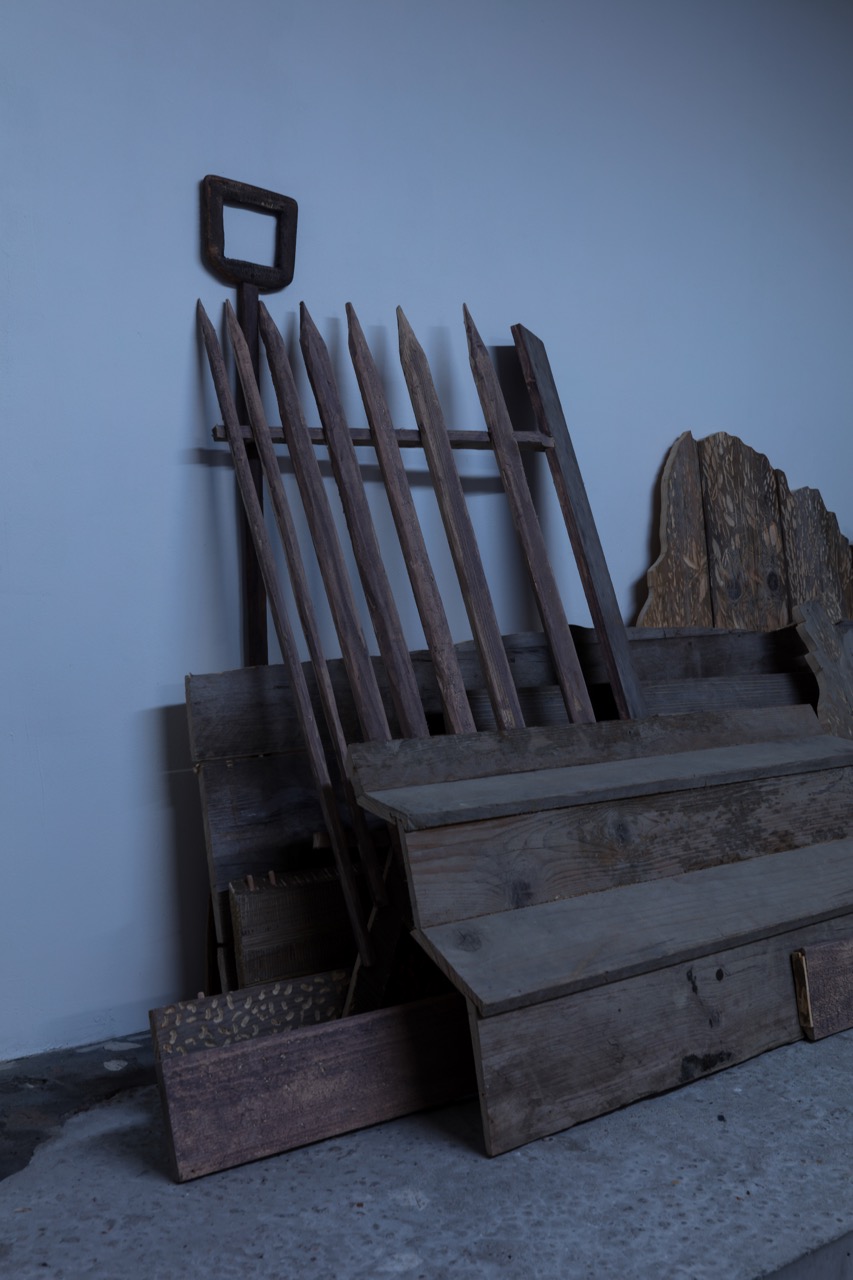
(c) Silvia Cappellari
︎ Chapter II, 28.04.24
Rocé, Par les damné·e·s de la terre: Chants de lutte 1969 - 1988 (2018), vinyl (label Hors Cadres) in a setting dedicated to Bernard-Marie Koltès's La Nuit juste avant les forêts (1977, éditions Stock 1980)
Rocé is a rapper close to the K1Fry Mafia and Dj Mehdi. Rocé has released four rap albums in French: Top départ (2002), Identité en crescendo (2006), L'être humain et le réverbère (2010) and Gunz n'Rocé (2013). In 2018, Rocé released under his own label Hors Cadre Par les damné.e.s de la terre, a compilation of songs, speeches and poems that bears witness to colonialism, immigration, labour, trade union and feminist struggles in the French speaking colonial context. In the spirit of internationalism the vinyl conveys a historical perspective of sang narratives to weave a network of solidarities across struggles. The vinyl is accompanied with a booklet of contextualizing notes prepared by Naïma Yahi and Amzat Boukari-Yabara.
The setting in which the vinyl is presented is dedicated to La Nuit juste avant les forêts [Night Just Before the Forests] by playwright and theater director Bernard-Marie Koltès. In La nuit (...), a person, with no real identity apart from being a stranger, meets another person and asks for a bed for the night. Their words are unstoppable, leaving no room for silence or reply. Their monologue becomes a repository of social violence, both enacted and experienced. In a raging rhythm combined with dazzling clarity, they share a meandering story of solitude and desillusions–a story that keeps repeating and thus should be retold.
Double Vinyl, 79’40’’ with booklet
Benches, platform, puddle, cigarette butts and compressed beer can (engravings, sculptures and drawings on scaffolding wooden panels, chalk, carbon, clay, aluminum structures)
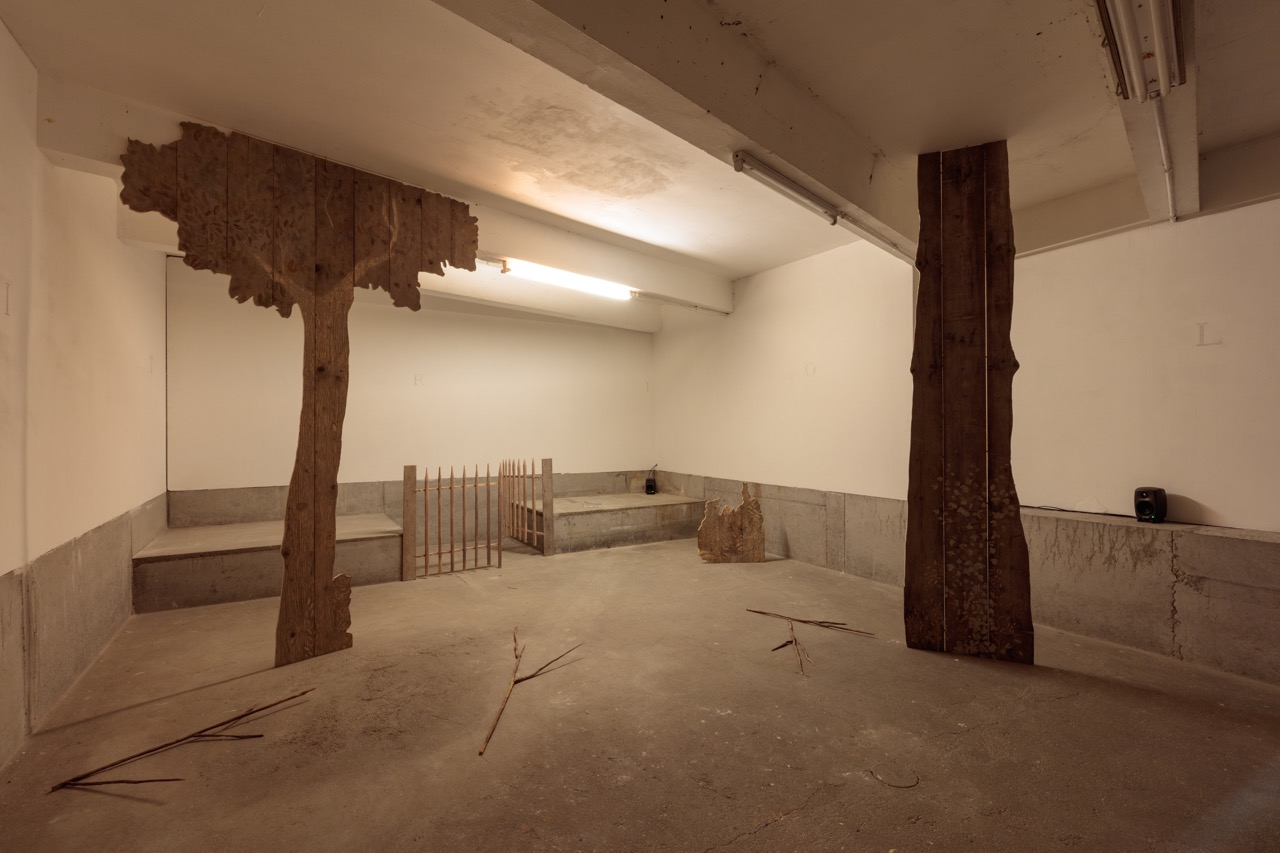
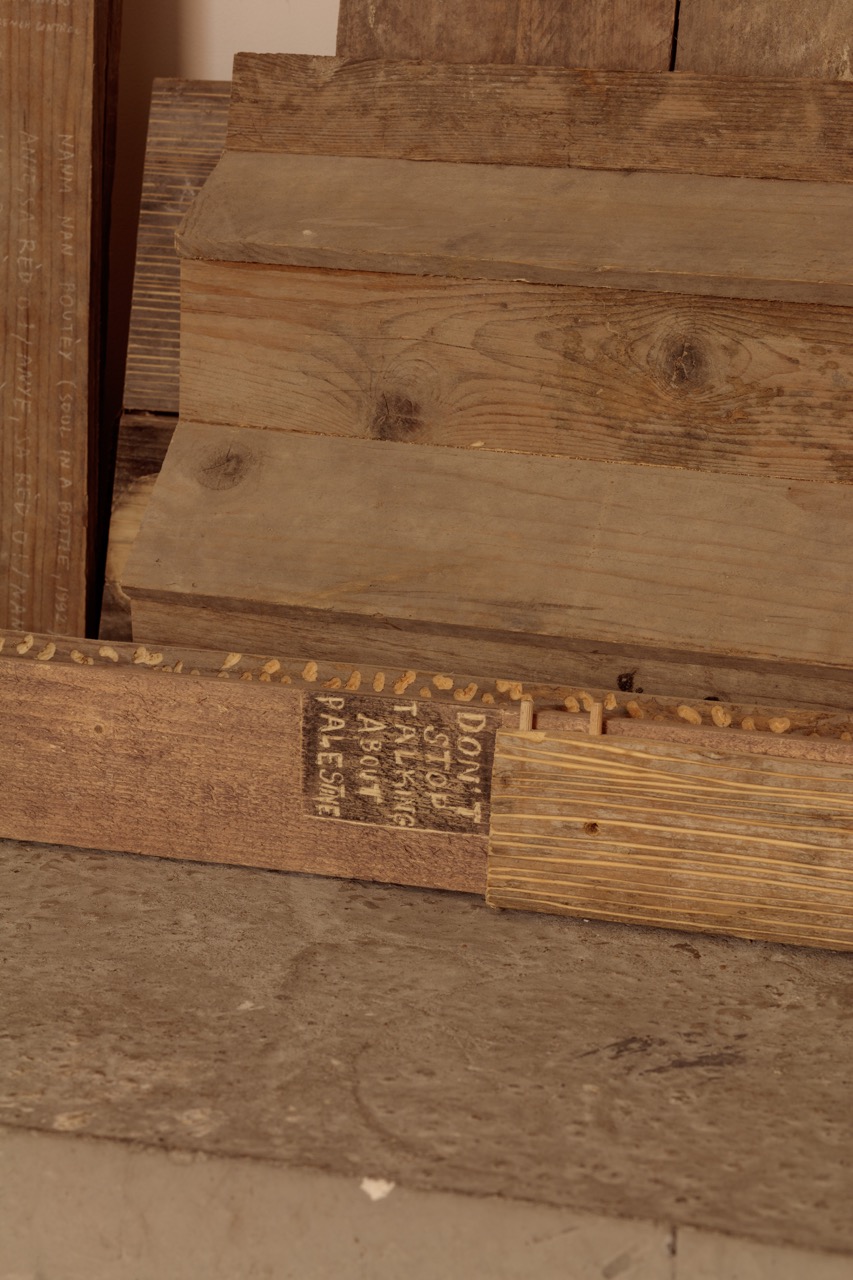
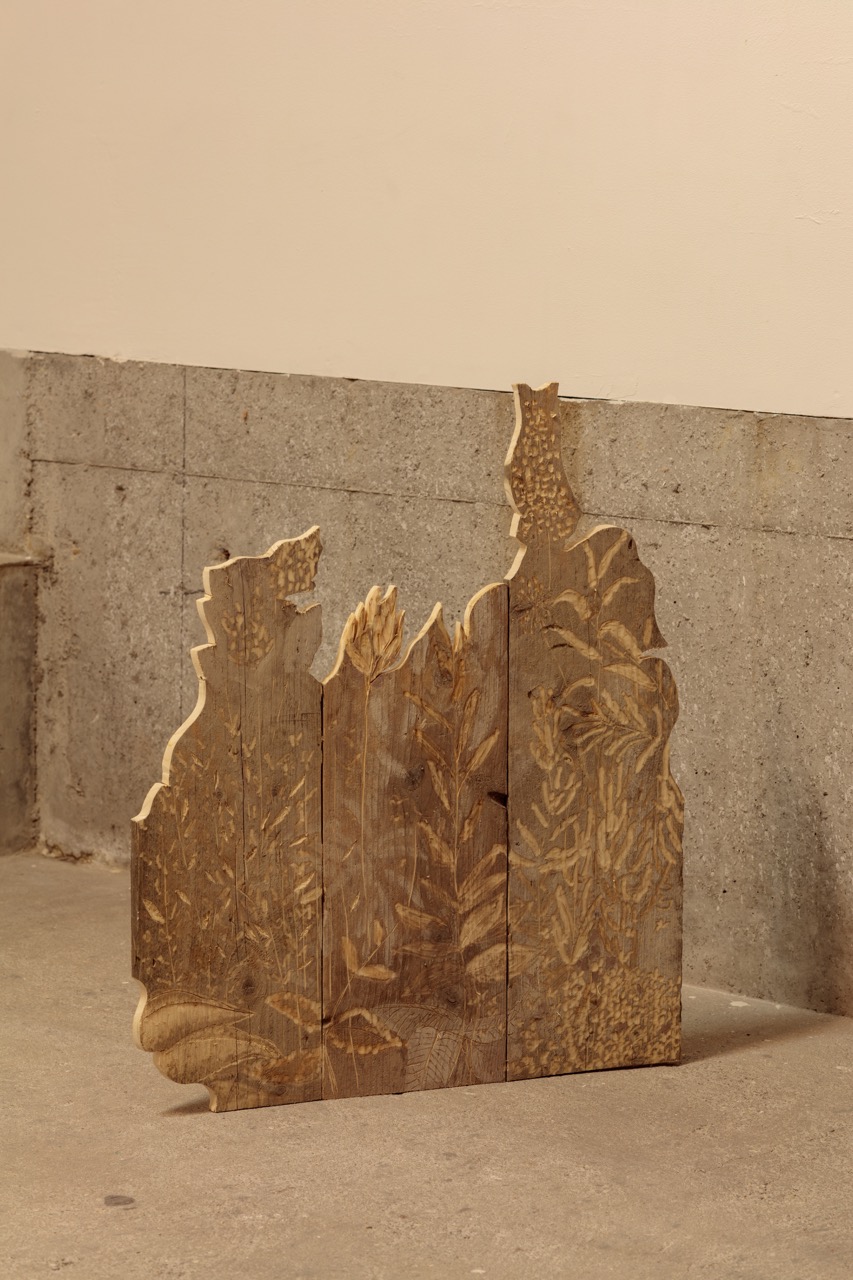
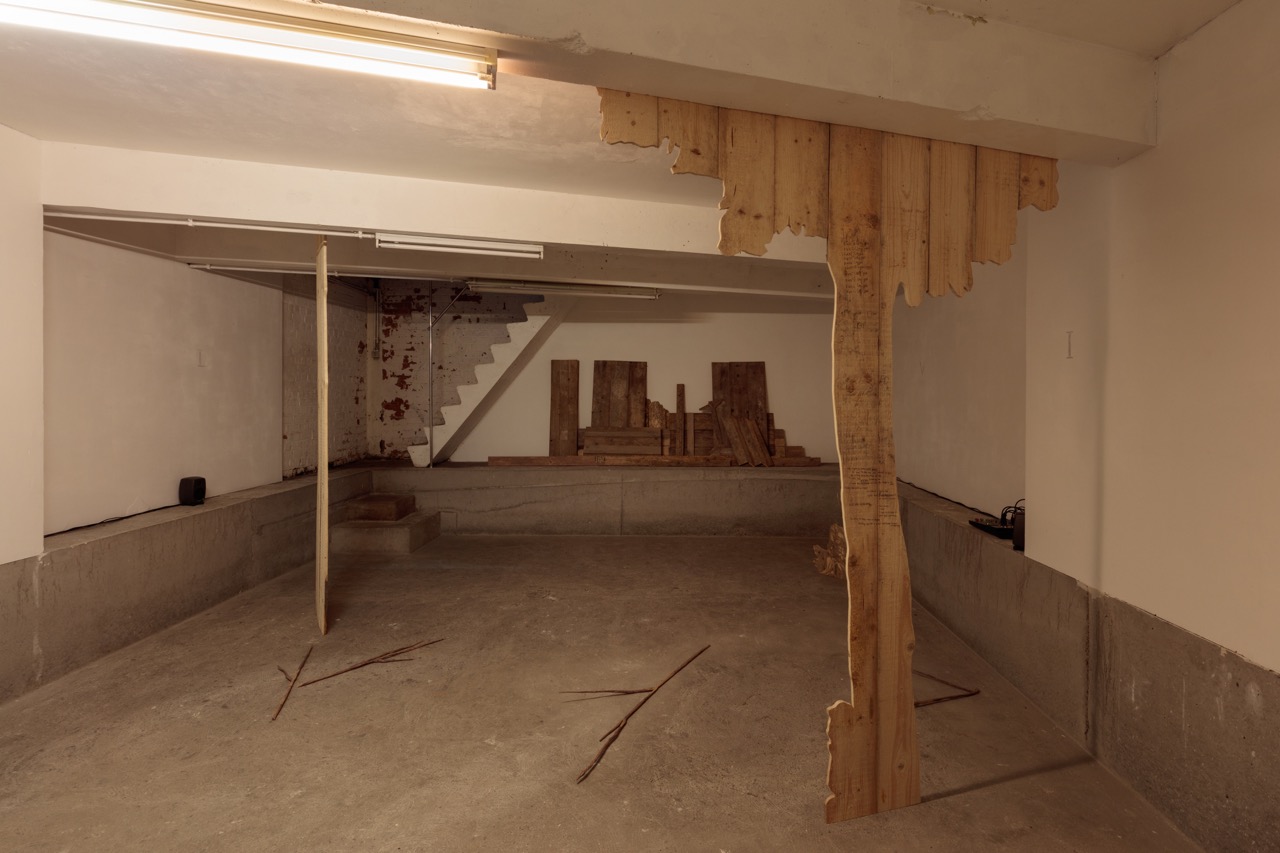
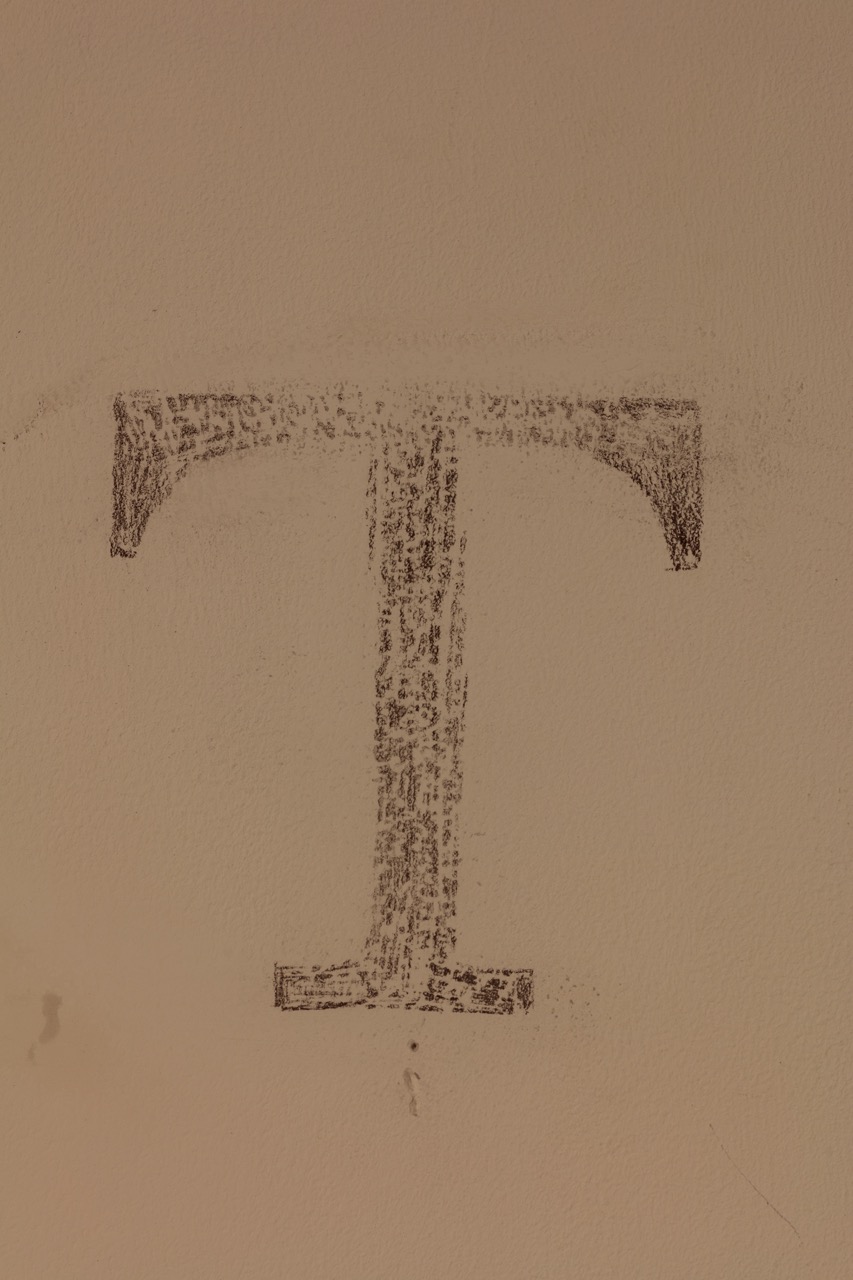
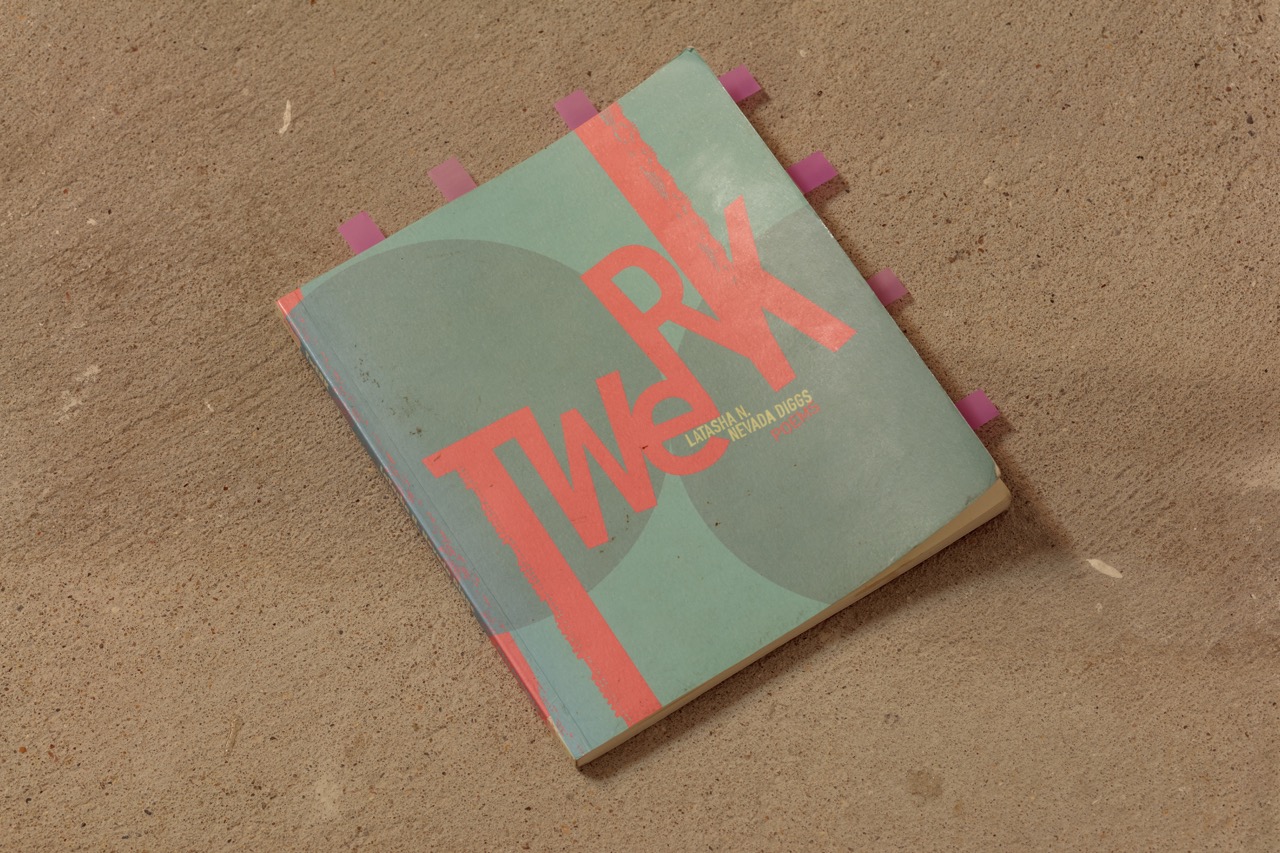
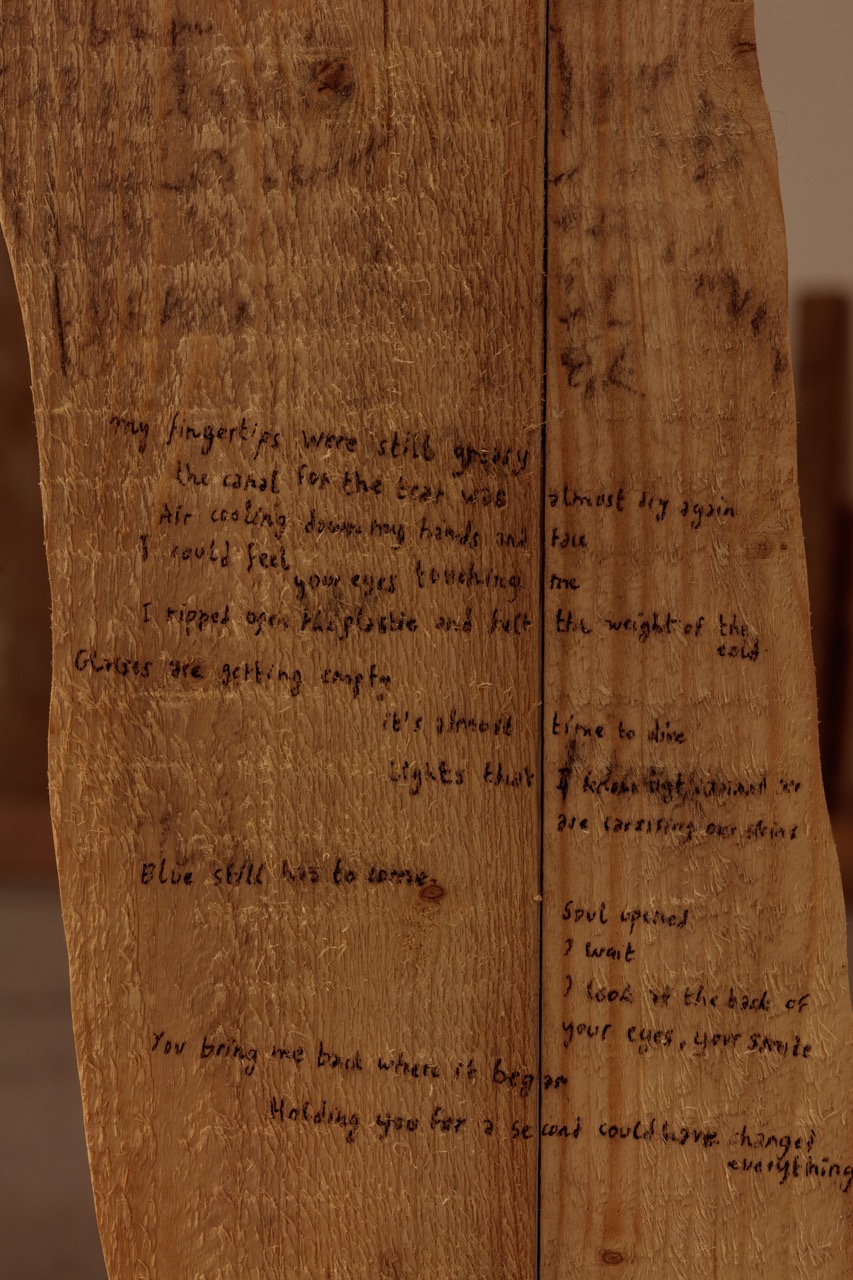
(c) Silvia Cappellari
︎ Chapter III, 09.05.24
LaTasha N Nevada Diggs, TwERK (2013), sound recording, readings of poems from Twerk, Belladona (2013) in a setting dedicated to David J. Melnick’s Men in Aïda (Tuumba Press 1983, Eclipse Archive 2002, punctum books 2004)
TwERK is a book of poems, songs, and myths by US writer, vocalist and sound artist, LaTasha N. Nevada Diggs. Thought of as a challenge to monolingualism, TwERK collides languages and jam with diction to reoperate the hierarchies of power between languages and cultures in the US context. Rooted in lyric, Black music and macaronic satire, TwERK offers many language artifacts fueled by multicultural vocabularies, idioms, and vernacular. The poetic procedures arise in the dialogue between hearing, speaking and writing, addressing mishearing and mistranslating as means for understanding.
The sound piece is a recording of 7 poems from TwERK and is presented in a setting dedicated to David J. Melnick’s Men in Aïda. Men in Aïda is a homophonic translation of Book One, Two and Three of Homer's Iliad into a farcical bathhouse faggotry scenario. Making a parallel between homophony and homosexuality, Melnick’s book unpacks the orality of language in which code switching, double entendre and misinterpretation become a space for representation and communication. The process of queering the work of the etymologist (addressing sameness outside of the structure of family and root words) reorients the work of translation to critical appropriation.
7 recorded poems
Trees, bushes, branches and gate (engravings, sculptures and drawings on scaffolding wooden panels, chalk, carbon, clay, aluminum structures).
︎ ARTISTS
Páola Revenióti is a documentarian, photographer, publisher, and trans* sexworker based in Athens, Greece. Since the late 70s Paola has been active in the greek LGBTIQ+ movement; she does not self-identify as an activist. Paola began publishing KRAXIMO, a trans-anarchist zine of “revolutionary homosexual expression”, in 1981. Through the 90s she organized in Athens some of the first Pride events in Greece. In recent years Páola has made documentary films, dealing with historical and sociopolitical topics, often from the so-called margins of society. Paola has been invited to present her work in festivals, squats, universities, and galleries in several countries.
Valerie Solanas is an American radical feminist known for the SCUM Manifesto, which she self-published in 1967. Solanas inhabited Andy Warhol's Factory scene, circulated among feminists and the countercultural underground, charged men money for conversation, despised "daddy's girls," and outlined a vision for radical gender dystopia.
Rocé is a multi-faceted French rapper. His real name is Youcef Kaminsky, and he was born in Bab-el-Oued (Algeria) in 1977. The son of resistance fighter and anti-colonialist Adolfo Kaminsky, Rocé's music reflects the rigor, militancy and hope that his parents passed on to him. He grew up in 9.4 in the Parisian region and was close to the K1Fry Mafia and Dj Mehdi, whose label he was one of the first to sign. Rocé has released 4 French rap albums: "Top départ" (2002), "Identité en crescendo" (2006), which won the Prix Charles Cros for writing, "L'être humain et le réverbère" (2010) and Gunz n'Rocé (2013). His song "Habitus" has been part of the 1ère SES curriculum since 2019.
Born in 1948, deceased in 1989 due to complications from AIDS, Bernard‑Marie Koltès is one of those shooting stars that streak across the literary sky and vanish all too quickly. His language reflects a world view pervaded by upheaval and the guilt of decolonization; his theater is urban, ambiguous, seductive. His intense, rigorous body of work includes the masterpieces Combat de n**** et de chiens (1979), Dans la solitude des champs de coton (1985), Le retour au désert (1988) and Roberto Zucco (1988).
A writer, vocalist and performance/sound artist, LaTasha N. Nevada Diggs is the author of Village (Coffee House Press 2023), TwERK (Belladonna, 2013) as well as the co-editor of Coon Bidness. Diggs has presented and performed at California Institute of the Arts, El Museo del Barrio, The Museum of Modern Art, and Walker Art Center and at festivals including: Explore the North Festival, Leeuwarden, Netherlands; Hekayeh Festival, Abu Dhabi; International Poetry Festival of Copenhagen; Ocean Space, Venice; International Poetry Festival of Romania; Question of Will, Slovakia; Poesiefestival, Berlin; and the 2015 Venice Biennale. As an independent curator, artistic director, and producer, Diggs has presented events for BAMCafé, Black Rock Coalition, El Museo del Barrio, Lincoln Center Out of Doors, and the David Rubenstein Atrium. Diggs has received a 2020 C.D. Wright Award for Poetry from the Foundation of Contemporary Art, a Whiting Award (2016) and a National Endowment for the Arts Literature Fellowship (2015), as well as grants and fellowships from Cave Canem, Creative Capital, New York Foundation for the Arts, and the U.S.-Japan Friendship Commission, among others. She lives in Harlem and teaches part-time at Brooklyn and Barnard College.
David Melnick was born in Illinois in 1938 and raised in Los Angeles, educated at the University of Chicago (where he studied with Hannah Arendt) and the University of California at Berkeley. Although he spent time in France, Greece, and Spain, most of his adult life was centered in San Francisco. For an author’s note he once wrote, “This poet’s politics are left, his sexual orientation gay, his family Jewish. . . . He is short, fat, and resembles Modeste Moussorgsky in face and Gertrude Stein in body type and posture.” A participant in the Free Speech movement, Melnick was a key member of G.A.W.K. (Gay Artists and Writers Kollective) and an early inspiration to the Language Poets. His masterpiece, Men in Aïda, began in a reading group organized by Robert Duncan.
Using research methodologies specific to performance, queer archiving and critical pedagogy, the work of Simon Asencio takes the form of performances, publications, exhibitions, collective study situations and co-creation projects. His current research focuses on the forms of sociability generated by textual practices, particularly in their relationship between poetic practice and political engagement.
Supported by Fédération Wallonie-Bruxelles, Loterie Nationale & Région Bruxelles-Capitale.


